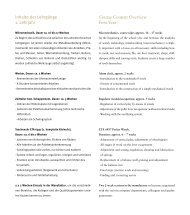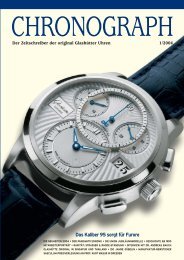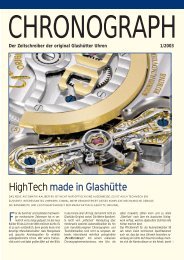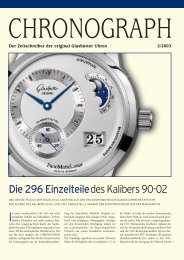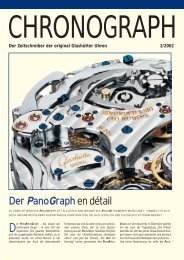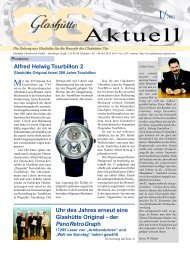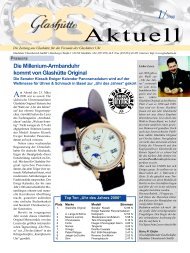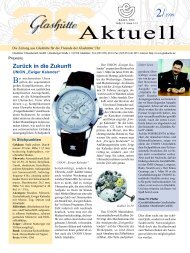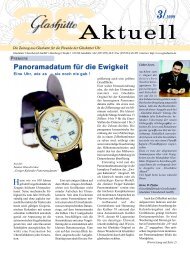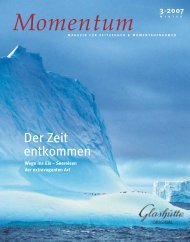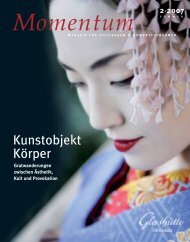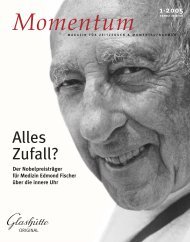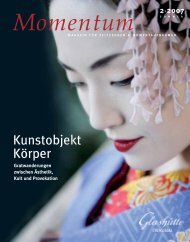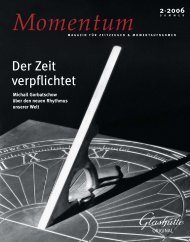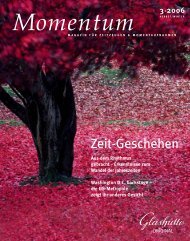2009 Momentum - Glashütte Original
2009 Momentum - Glashütte Original
2009 Momentum - Glashütte Original
Create successful ePaper yourself
Turn your PDF publications into a flip-book with our unique Google optimized e-Paper software.
Photos: Imago, Getty, Picture-Alliance (3)<br />
8 <strong>Momentum</strong> 1· <strong>2009</strong><br />
Icon Franz Josef Radermacher<br />
“Time is the<br />
final resource”<br />
Prof. Franz Josef Radermacher is a member of the Club of Rome<br />
and a co-founder of the Global Marshall Plan Initiative.<br />
The progressive thinker looks into the future and explains why he<br />
believes in humanity’s ability to shape it to our common benefit<br />
Interview Maike Zürcher<br />
Prof. Radermacher, would you say that you are a visionary?<br />
Yes, I’d call myself a visionary.<br />
What is it that makes you a visionary?<br />
Typically, a visionary can imagine things that do not exist as yet.<br />
In my case these things tend to be future developments that could<br />
benefit humankind. My background and interests lie in mathematics<br />
and computer science, and these are disciplines that often address<br />
hypothetical ideas and constructs. I think this puts me in a good<br />
position to dream up the sort of things one expects of a visionary.<br />
You are an active member of the Club of Rome, which was founded<br />
in 1968. What are the fundamental differences between how the<br />
world is today and how it was back then?<br />
The situation back then was by no means simple, but it was a<br />
good deal more manageable than it is today. The population of<br />
the world was less than 65 percent of what it is now, and our consumption<br />
of resources was decidedly more modest. There was<br />
also a general consensus that cooperation between North and<br />
South was necessary and that nation states had an important role<br />
to play in this regard. Because of the East-West conflict, market<br />
fundamentalism was unable to assert itself. And half of the world<br />
wasn’t even participating in global economic processes or growth.<br />
For many reasons, ecological and sociological approaches were<br />
more widespread back then. Yet there was also the very real threat<br />
of war between East and West and of Armageddon. So the world<br />
was a very different place in 1968.<br />
What is the Club of Rome particularly concerned with at the moment?<br />
The Club of Rome addresses topics of the day that concern our<br />
future development, taking a systematic, integrated approach. This<br />
is something it has always done. It regards the problems currently<br />
being experienced by the global financial system as confirmation<br />
that its stance is the correct one. The crisis is due to inadequate<br />
governance around the world, and more importantly, to the prev -<br />
ailing market-based approach to questions of the economy and<br />
global development. What we need instead is a global market<br />
economy based on ecological and sociological principles that<br />
incorporates closer cooperation between North and South. More<br />
stringent rules need to be applied to the exploitation of natural<br />
resources and raw materials; we must cross-finance development;<br />
we must concentrate on the United Nation’s Millennium Develop -<br />
ment Goals; and we must work to establish a balance and understanding<br />
between the world’s major cultures.<br />
You were one of the founders of the Global Marshall Plan Initiative.<br />
Was there a specific reason behind its inception?<br />
The foundation of the Global Marshall Plan Initiative was a result



